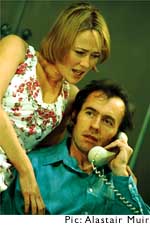
Powerful and Rivetting: Jennifer Ehle and Stephen Dillane, photo by Alastair Muir
The Real Thing By Tom Stoppard. Dir: David Leveaux.Stephen Dillane, Jennifer Ehle, Nigel Lindsay Rating: 2 out of 3 stars
Deliver us from plays in which brilliant, middle-aged playwrights succumb to adultery, betrayal and true love with gorgeous young actresses. I would have argued so until last night when Tom Stoppard's 17-year-old poignant comedy about just such a man made nonsense of my conviction. The Real Thing does not just make sympathetic, searching fun of people caught in the toils of adultery. It ignores the lure of romantic cliches and stages a compelling journey in which Henry, a middle-aged playwright, comes to understand and accept a new version of erotic love. A rivetting Stephen Dillane, whose elitist Henry rarely raises voice, eyebrow or emotional temperature, camouflages his pain like a soldier.

Powerful and Rivetting:
Jennifer Ehle and Stephen Dillane, photo by Alastair Muir
This being Stoppard country, a place where you cannot avoid warning signs that a superior intelligence is at work, The Real Thing keeps raising questions about what's real and faked and involves more than the wrecking of two marriages. Vicki Mortimer's stage set, with sliding panels, a vague impression of smart living and too many props pushed around, reminds you Stoppard's emphasis is on what people do to each other, not where they are. The first rather Pinteresque scene, where a woman's adulterous liaison is revealed to her husband, turns out merely to be an extract from Henry's West End play.
This dramatisation proves to be the fictitious premonition of the adultery, jealousies and marriage break-up in which the two actors are involved in real life. For the actress in the play is Henry's actual, scathing spouse Charlotte (impressive Sarah Woodward). And the actor is Max, whose actress-wife, Annie, has already launched her affair with Henry. The disturbing parallel between art and real-life experience, between the artificial and authentic, runs all through the play: Annie, whom the fabulous Jennifer Ehle powerfully makes a fraught, alluring girl who responds to each true nudge of desire, is seen playing a Jacobean heroine in love with her own brother. The passion on stage then blazes into a real-life affair between the two actors.
The impact of Annie's betrayal upon Henry leads to the difficult heart of Stoppard's play. David Leveaux's deft production has revelled in the cleverness of Stoppard's wit and humour at the expense of marriage breakers. But now the tone changes, like darkness sweeping down. Henry believes true lovers know each other completely, with all masks down, and as no one else can. But he's staging a romantic fiction in his mind no more "real" than a performance.
Dillane at this point does something remarkable. All along he has played with a quiet, relaxed naturalness rarely seen on stage. When his loftily superior Henry slips to human level and feels the pain of sexual jealousy, Dillane hardly lets slip a flicker of emotion as he prepares for the "real thing" of love - to accept its limits and derelictions, while keeping his faith in the errant Annie alive. He puts on a brave, stoic front which is far more affecting than mere histrionics.
Dillane's performance even makes self-mocking light of Henry's grand elitism when faced with Brodie, the pacifist, working-class soldier whom Annie befriends, and whose life-story proves false. Stoppard has cast the pains and pleasures of keeping love alive in a radiant light.
Back to The Real Thing Article Index